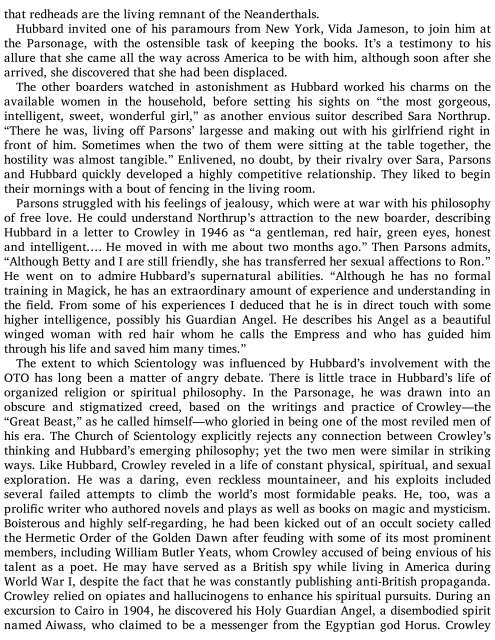going-clear-scientology-hollywood-and-the-prison-of-belief-by-lawrence-wright-2
going-clear-scientology-hollywood-and-the-prison-of-belief-by-lawrence-wright-2
going-clear-scientology-hollywood-and-the-prison-of-belief-by-lawrence-wright-2
You also want an ePaper? Increase the reach of your titles
YUMPU automatically turns print PDFs into web optimized ePapers that Google loves.
that redheads are <strong>the</strong> living remnant <strong>of</strong> <strong>the</strong> Ne<strong>and</strong>erthals.<br />
Hubbard invited one <strong>of</strong> his paramours from New York, Vida Jameson, to join him at<br />
<strong>the</strong> Parsonage, with <strong>the</strong> ostensible task <strong>of</strong> keeping <strong>the</strong> books. It’s a testimony to his<br />
allure that she came all <strong>the</strong> way across America to be with him, although soon after she<br />
arrived, she discovered that she had been displaced.<br />
The o<strong>the</strong>r boarders watched in astonishment as Hubbard worked his charms on <strong>the</strong><br />
available women in <strong>the</strong> household, before setting his sights on “<strong>the</strong> most gorgeous,<br />
intelligent, sweet, wonderful girl,” as ano<strong>the</strong>r envious suitor described Sara Northrup.<br />
“There he was, living o Parsons’ largesse <strong>and</strong> making out with his girlfriend right in<br />
front <strong>of</strong> him. Sometimes when <strong>the</strong> two <strong>of</strong> <strong>the</strong>m were sitting at <strong>the</strong> table toge<strong>the</strong>r, <strong>the</strong><br />
hostility was almost tangible.” Enlivened, no doubt, <strong>by</strong> <strong>the</strong>ir rivalry over Sara, Parsons<br />
<strong>and</strong> Hubbard quickly developed a highly competitive relationship. They liked to begin<br />
<strong>the</strong>ir mornings with a bout <strong>of</strong> fencing in <strong>the</strong> living room.<br />
Parsons struggled with his feelings <strong>of</strong> jealousy, which were at war with his philosophy<br />
<strong>of</strong> free love. He could underst<strong>and</strong> Northrup’s attraction to <strong>the</strong> new boarder, describing<br />
Hubbard in a letter to Crowley in 1946 as “a gentleman, red hair, green eyes, honest<br />
<strong>and</strong> intelligent.… He moved in with me about two months ago.” Then Parsons admits,<br />
“Although Betty <strong>and</strong> I are still friendly, she has transferred her sexual aections to Ron.”<br />
He went on to admire Hubbard’s supernatural abilities. “Although he has no formal<br />
training in Magick, he has an extraordinary amount <strong>of</strong> experience <strong>and</strong> underst<strong>and</strong>ing in<br />
<strong>the</strong> eld. From some <strong>of</strong> his experiences I deduced that he is in direct touch with some<br />
higher intelligence, possibly his Guardian Angel. He describes his Angel as a beautiful<br />
winged woman with red hair whom he calls <strong>the</strong> Empress <strong>and</strong> who has guided him<br />
through his life <strong>and</strong> saved him many times.”<br />
The extent to which Scientology was inuenced <strong>by</strong> Hubbard’s involvement with <strong>the</strong><br />
OTO has long been a matter <strong>of</strong> angry debate. There is little trace in Hubbard’s life <strong>of</strong><br />
organized religion or spiritual philosophy. In <strong>the</strong> Parsonage, he was drawn into an<br />
obscure <strong>and</strong> stigmatized creed, based on <strong>the</strong> writings <strong>and</strong> practice <strong>of</strong> Crowley—<strong>the</strong><br />
“Great Beast,” as he called himself—who gloried in being one <strong>of</strong> <strong>the</strong> most reviled men <strong>of</strong><br />
his era. The Church <strong>of</strong> Scientology explicitly rejects any connection between Crowley’s<br />
thinking <strong>and</strong> Hubbard’s emerging philosophy; yet <strong>the</strong> two men were similar in striking<br />
ways. Like Hubbard, Crowley reveled in a life <strong>of</strong> constant physical, spiritual, <strong>and</strong> sexual<br />
exploration. He was a daring, even reckless mountaineer, <strong>and</strong> his exploits included<br />
several failed attempts to climb <strong>the</strong> world’s most formidable peaks. He, too, was a<br />
prolic writer who authored novels <strong>and</strong> plays as well as books on magic <strong>and</strong> mysticism.<br />
Boisterous <strong>and</strong> highly self-regarding, he had been kicked out <strong>of</strong> an occult society called<br />
<strong>the</strong> Hermetic Order <strong>of</strong> <strong>the</strong> Golden Dawn after feuding with some <strong>of</strong> its most prominent<br />
members, including William Butler Yeats, whom Crowley accused <strong>of</strong> being envious <strong>of</strong> his<br />
talent as a poet. He may have served as a British spy while living in America during<br />
World War I, despite <strong>the</strong> fact that he was constantly publishing anti-British propag<strong>and</strong>a.<br />
Crowley relied on opiates <strong>and</strong> hallucinogens to enhance his spiritual pursuits. During an<br />
excursion to Cairo in 1904, he discovered his Holy Guardian Angel, a disembodied spirit<br />
named Aiwass, who claimed to be a messenger from <strong>the</strong> Egyptian god Horus. Crowley


